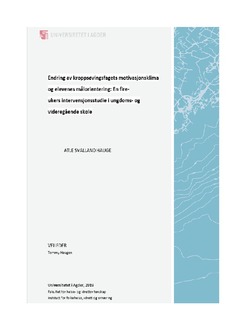| dc.description.abstract | The purpose of this project was to investigate if the Physical Education-teacher could have animmediateeffecton the pupils’perceived motivational climate. Also,if this could impact thepupils’goal orientations.Achievement Goal Theory was used as a theoretical background for the project.The project is an intervention study, witha cross-over design. The sample consisted of202Norwegian pupils in schools located insouth of Norway. Of these,55% were boys and 45% were girls. The TARGET-model was used as a didacticaltool for structuringthe activity lessons. The intervention comprisedtwo lessonswith highego-involving climate,and two lessonswith hightask-involving climate. The sports that wereused in the project werebasketball (one lessonwith ego-involving climate and one lessonwith task-involving climate) and floor hockey (one lessonwith ego-involving climateand one lessonwith task-involving climate). The results showed thattheego-involving climate interventions produceda significant increase in the pupils’perceived ego-involving climate, andasignificant reduction in the pupils’perceived task-involvingclimate. There was nosignificant increase in task-involving climate after two lessonswith high focus on task mastery, but the pupils’perceived ego-involving climate decreased significantly. Furthermore, there was nosignificant increase in ego orientation after two lessonswith high focus on performance, but the pupils didsignificantlyreduce their level oftask orientation. The pupils did not get a significant increase in task orientation after two lessonswith high focus on task mastering, but the pupils did get a significant decrease in ego orientation. The project might give insights on how much influence a PE-teacher can have on pupils’perceived motivational climate. Also, it could give indicationsonpossibleconsequences on pupils’ goal orientations. More research in the field of motivational climate and goal orientationsin the PE-setting are warranted. Keywords:Goal orientation, ego orientation, task orientation, motivational climate, ego-involved climate, task-involved climate | nb_NO |

